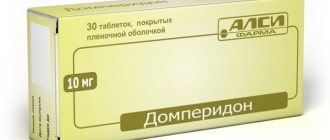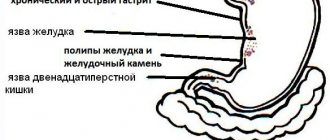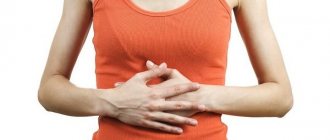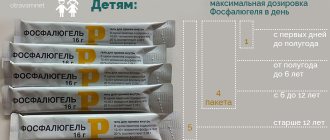According to statistics, about 60% of people complain of a burning sensation in the stomach after eating. This rarely happens once, most often this symptom occurs with pathologies of the stomach. Stomach burning is not synonymous with heartburn. Heartburn is treated a little differently, manifests itself differently and arises from other causes.
Heartburn is a burning sensation behind the breastbone due to the backflow of gastric contents as a result of disruption of the dividing sphincter between the stomach and esophagus. A burning sensation behind the sternum is a burning sensation in the esophagus with reflux esophagitis. This causes increased salivation and a sour taste in the mouth. Heartburn can be associated with the nature of food, tight clothing, bending, etc. Often, burning of the esophagus after eating and in the stomach are often combined. Their etiology is different, but the treatment is almost identical.
Causes of burning sensation in the stomach
The stomach is lined with mucous membrane, the cells of which produce mucin (mucus), which is protective. Mucus covers the walls of the stomach to a thickness of 0.5 mm. It not only prevents pathogens from entering, but also protects the stomach from aggressive hydrochloric acid and pepsin, which the stomach itself produces. Otherwise, the stomach wall would begin to digest itself. Thus, a burning sensation in the stomach is a consequence of a violation of the acid-base balance (acid-base balance) in the acidic direction.
To digest food, you need, first of all, hydrochloric acid and the enzyme pepsin. Their mixture is very aggressive, so much so that it is capable of breaking down any organic substances. Normally, hydrochloric acid is produced exactly as much as is needed to digest the food bolus.
The walls of the stomach could also be burned by this mixture, if not for the protection of mucin in the mucous membrane. The esophagus is also lined with mucous membrane, but it has no protective properties.
Why can a burning sensation in the stomach after eating bother a person? If the gastric mucosa is damaged by any aggressive irritating factor, its protective functions are lost.
In such cases, aggressive damaging factors are able to penetrate deep into the wall of the stomach with subsequent damage. This phenomenon easily causes an uncomfortable burning sensation in the stomach immediately after eating.
Stomach ulcer
The occurrence of epigastric pain often indicates the presence of a gastric ulcer - this is a wound on the gastric mucosa.
The two most common causes of ulcers are Helicobacter pylori infection and frequent use of medications known as NSAIDs (pain relievers).
There are many myths about peptic ulcers. Ulcers are not caused by emotional stress or spicy foods. Certain foods may irritate an ulcer that is already there, but the food is not the cause of the ulcer. – American College of Gastroenterology
Signs of an ulcer
Dull or burning pain in the abdomen is the most common symptom of peptic ulcer disease. The pain most often occurs when the stomach is empty, between meals or at night. The pain may come and go for days, weeks, or months.
Less common symptoms may include:
- swelling;
- burping;
- nausea;
- poor appetite;
- vomiting;
- weight loss.
The most important symptoms that cause ulcers are related to bleeding. Bleeding from an ulcer may be slow and go unnoticed or may cause a life-threatening condition.
A person requires immediate medical attention if they have :
- acute abdominal pain that does not go away;
- blood in the stool or black stool;
- vomit that contains red blood or looks like coffee grounds;
- fainting or weakness.
These symptoms may be signs that a peptic ulcer is causing a life-threatening condition.
Methods for treating stomach ulcers
An important part of treating ulcers is identifying what causes them. Patients with ulcers caused by NSAIDs should talk to their doctor about other medications that can be used to treat pain.
If a person is infected with H. pylori, the infection should be treated. It is very important to complete the full course of antibiotic treatment. It is equally important to make sure that the infection is destroyed.
What food can be wrong for the stomach?
Harmful to the stomach:
- Foods high in fiber begin to act like sandpaper, injuring the mucous membrane. Among such products are the beloved bran bread, some vegetables (beets, raw cabbage) and fruits.
- A burning sensation in the stomach after eating can also be caused by pickles, smoked foods, marinades, spicy and fried foods. Many of these products contain carcinogens, acids, trans fats and other harmful substances.
- Fermented milk products with high acidity often cause a slight burning sensation in the stomach after eating.
- Sour fruits such as citrus fruits.
- Long-term abstinence from food has a detrimental effect on the mucous membrane.
- Foods that are undesirable for the stomach include any alcohol, fast food, soda, and chips.
- Also, the cause of a burning sensation in the stomach after eating can be due to nervous strain, frequent stress, taking drugs with an irritating effect - aspirin, NSAIDs, antibiotics before meals, iron, potassium supplements, etc.
- Provoking factors include excess weight and smoking. In obesity, the stomach is surrounded by fat, which slows down the process of breaking down food and its absorption. Therefore, burning in the stomach and esophagus after eating is a constant symptom in obese people.
However, that's not all. Pain is added to the above symptom. A burning sensation in the stomach after eating provokes many unpleasant symptoms. A vicious circle is formed, and the destruction of the mucous membrane continues to progress and deepen if measures are not taken. Besides everything, it is very harmful to overeat, especially at night.
Other causes of burning in the stomach after eating:
- bacterial infections (in 90% of cases it is the Helicobacter bacterium);
- hormonal imbalance;
- food that is too cold or hot;
- instant strong coffee;
- irregularity of food intake;
- diaphragmatic hernia;
- diseases of the stomach itself with high acidity - ulcers and gastritis;
- oncological formations;
- bad ecology;
- poor quality water;
- lifting weights;
- pregnancy (especially in the last trimester, when the enlarged uterus begins to put pressure on the stomach).
Sucks in the pit of the stomach
When faced with danger, acute sensations, fear or getting into a nervous situation, a person may feel discomfort in the epigastric region, which cannot be called painful. They say about it like this: “It sucks in the pit of your stomach.” The fact is that when the nervous system is excited, the motor activity of the stomach also increases. The second situation in which you can experience this sensation is hunger or active secretion of gastric secretions. What is the sucking feeling in the epigastric region connected with: nerves or the work of the stomach? Let's clarify this issue.
The feeling of something sucking in the pit of your stomach is, in fact, absolutely physiological
You can start sucking in the pit of your stomach a couple of hours after a meal. This feeling is encountered more often by individuals with a choleric character or simply by impressionable people with an active, agile psyche. There is even an official name for the desired sensation: the motor migratory complex.
MMC is the contractile activity of the stomach, which is repeated cyclically in the interdigestive time period. Typically, the motor migratory complex occurs during a period when the digestive tract is at rest. As soon as a person has eaten, the MMC is interrupted, as the activity of the organ changes. Why does the body need MMC? In the process, food debris, mucus, bacteria, and gastric secretions migrate through the digestive tract.
The migrating motor complex in healthy people is characterized by constancy of characteristics and consists of cyclically repeating phases
The contractile motor cycle lasts from one and a half to two hours, most of this time occurs in the resting phase (first phase). Muscle contractions (second phase) occur later, increase gradually, reaching their greatest intensity in the third phase. It lasts no more than five to six minutes and is a maximum outbreak of gastrointestinal motility activity, which doctors call the motor migratory complex. This is what people perceive as sucking in the pit of the stomach.
When the third phase ends, a short passage begins when motor activity decreases. A decrease in motility is also associated with diet - the more hungry a person is, the lower the contractile activity of the gastrointestinal tract. So, after a day of fasting, activity drops by 70 percent.
Structure of the human gastrointestinal tract
Important point! The sucking sensation in the epigastric region should not be confused with hunger pain in the stomach. This is a slight feeling of emptiness, not pain. Hunger pains are the result of prolonged fasting, more than three to four days. Sucking in the epigastrium begins much earlier - from several hours to a day, depending on the speed of metabolism in the human body.
Most often, the stomach is in good shape in young, active, healthy people. Also, gastric tone and the feeling of “sucking in the pit of the stomach” are familiar to those who have low blood sugar. If there is a sucking sensation in the pit of the stomach at night, then we may be talking about a hormonal imbalance. Thus, discomfort in the epigastric region is often caused by a lack of cortisol, leptin, ghrelin or neuropeptides.
Why does it suck in the pit of the stomach?
Table 2. Why does it suck “in the pit of the stomach”?
| Time period, circumstances | Possible reason |
| No more than five minutes, goes away on its own | The stomach muscles move; in other words, the organ simply stretches. |
| More than ten minutes, not associated with hunger | State of stress, panic. You shouldn’t immediately seize this feeling, you need to switch to something, drink mint tea, lie down. |
| Immediately after a meal or within a short time after a meal | Reduced blood sugar levels. Mistaking the feeling of thirst for a feeling of hunger (the centers of saturation with food and liquid are located nearby, so a person often feels hungry when he is actually thirsty). |
| Regularly throughout the day | Stress, fatigue, sleep disturbances, too active work schedule, inability to fully restore the body’s strength. |
| After a meal that includes fatty, hot, spicy foods | Stress, fatigue, sleep disturbances, too active work schedule, inability to fully restore the body’s strength. |
| After a meal that includes fatty, hot, spicy foods | Pancreatic reaction. As a rule, a sucking sensation in the epigastrium is accompanied by belching and heartburn. |
| 6-7 hours after eating, accompanied by increasing pain | Gastritis, peptic ulcer. It is necessary to visit a gastroenterologist and examine the stomach. |
Proper nutrition is the key to health
Symptomatic manifestations
A burning sensation in the stomach may be accompanied by morning sickness, pain that radiates to the back, and belching with burning of the throat mucosa. One of the most common symptoms is a metallic smell from the mouth. If your stomach burns after eating, the cause may be an ulcer or gastritis.
In these pathologies, the mucous membrane is already damaged. When an additional portion of acid or bile hits it, pain occurs, perceived as a burning sensation. This is especially true during hunger.
Gastritis
Pain in the epigastric region is often provoked by gastritis - inflammation of the gastric mucosa. According to statistics, more than half of people from all over the world suffer from various forms of gastritis.
Gastritis is caused in most cases by the bacterium Helicobacter pylori. Less commonly, gastritis can occur due to frequent use of painkillers, excessive alcohol consumption, stress, and other diseases and conditions.
Signs of illness
Many people with gastritis have no symptoms. If symptoms are present, they may include:
- discomfort or pain in the epigastric region;
- nausea;
- vomiting;
- loss of appetite.
If gastritis causes bleeding from the stomach lining, symptoms may include:
- shortness of breath;
- dizziness and weakness;
- red blood in vomit;
- black chair;
- pallor.
A person with any signs or symptoms of bleeding in the stomach should see a doctor immediately.
Methods for treating gastritis
Treatment of epigastric pain with gastritis depends on the specific cause that caused this condition.
Sometimes it is enough to stop drinking alcohol or stop taking painkillers. In other cases, antibiotics may be needed to kill the H. pylori bacteria or other medications may be needed to reduce stomach acid production.
Heartburn
Heartburn is accompanied by a burning sensation in the gastric cavity almost always, regardless of etiology. Why does there be a burning sensation in the stomach after eating? For a more precise diagnosis, simply observe when exactly the burning sensation occurs. If it appears immediately after eating, most often it indicates gastritis. By the way, half of the world's population suffers from this disease.
With gastric ulcer (stomach ulcer), pain appears on an empty stomach or some time after eating. If a burning sensation occurs in the morning or evening, with pain in the epigastrium or on the right, most likely it is a duodenal ulcer.
The epigastric region: features
The epigastric or epigastric region is divided into three segments:
- Left hypochondrium area;
- Right hypochondrium area;
- Epigastric center.
Epigastric, intergastric and epigastric - different names for one area of the human body
In general, several important organs are projected in the epigastrium: most of the stomach, loops of the small intestine, the upper poles of the kidneys, the left upper hepatic lobe, the initial part of the duodenum. If a person complains of pain in the pit of the stomach, a medical professional can determine which organs may be causing such symptoms and prescribe specific tests.
Thus, discomfort or pain in the central part of the epigastric region indicates ailments affecting the liver or stomach. Pain in the left hypochondrium indicates diseases of the spleen or liver, in the right - about problems in the gallbladder.
The causes of stomach pain can be various pathological and physiological conditions.
The epigastric zone plays an important role in clinical examination, since it is in it that a high percentage of the formation and concentration of pain is noted. This is due to the close location of the organs to this area, as well as the vulnerability of the epigastrium itself. Considering the location of the epigastric zone, it is quite sensitive to various types of injuries and damage, so you need to pay special attention to the safety of the area you are looking for.
Note. Doctors insist that one cannot ignore painful sensations in the pit of the stomach, which can be either the first sign of illness or a serious symptom.
Diagnostic measures
For diagnosis it is necessary to undergo a number of studies:
- X-ray of the stomach is the first and safest method. It has no contraindications. The method is informative because it allows you to see an ulcer in the early stages, various deviations in the shape of the stomach, its external changes, as well as neoplasms.
- EGDS is the most modern, fastest and most popular diagnostic method. The mucous membrane is completely visible. Comprehensive information about the condition of the esophagus, stomach and duodenum is provided. The examination is carried out quite quickly, but has contraindications.
- A study of gastric juice is necessary because a burning sensation in the stomach after eating is always associated with an increase in acidity. The study can accurately determine the composition, acidity and pH of the juice and its deviations from the norm.
- Analysis for the presence of infection - we are talking about Helicobacter pylori. In 90% of cases it is the cause of stomach disease. Basically, a breath test is performed to check for the presence of Helicobacter pylori. A gastric biopsy may also be performed if cancer is suspected.
Diagnostics
If you experience a burning sensation in the area of the esophagus and stomach, then it’s time to make an appointment with a therapist or gastroenterologist. Diagnosis of pathology includes a whole range of studies:
- electrocardiographic study;
- laboratory examination of blood, urine and feces;
- X-ray or FGDS.
Since discomfort in the stomach and esophagus does not always indicate the presence of gastric ailments, it makes sense to consult a cardiologist and endocrinologist.
To identify gastric diseases, it is recommended to undergo gastroscopy using a flexible probe. The method is intended for examining the mucous membrane of the epigastrium and duodenum. If this method is contraindicated for you, then you can find out the cause of the burning sensation by taking x-rays.
Possible complications
Ignoring a burning sensation in the stomach for a long time leads to changes in the mucous membrane, and the inflammatory process begins. If even after this treatment there is no treatment, the inflammation of the mucous membrane becomes chronic, spreading not only in depth, but also in breadth, covering a large area.
In addition, inflammation can spread to neighboring organs, including the duodenum, gallbladder and pancreas. This is already advanced chronic gastritis. Erosion of the mucous membrane is replaced by a stomach ulcer.
Why does epigastric pain occur?
In the epigastric and hypogastric zones, pain of various types and intensities is present.
p, blockquote 10,0,0,0,0 —>
p, blockquote 11,0,0,0,0 —>
Mild pain is observed after eating; more severe pain can occur spontaneously and radiate to the chest, shoulder blade, and neck.
They are caused by inflammatory diseases of the gastrointestinal tract and more.
p, blockquote 13,1,0,0,0 —>
- Fullness and tingling in the epigastric area indicate a gastric ulcer, hernia, or the presence of stones in the gall bladder.
- The addition of heartburn indicates reflux disease.
- A feeling of heaviness in the abdomen occurs during pregnancy. Fluctuations in hormonal levels affect the state of the gastrointestinal tract: the digestion process slows down, pressure in the abdominal cavity gradually increases. Women have problems with bowel movements.
The most common causes of discomfort in the epigastric region are gastrointestinal pathologies:
p, blockquote 14,0,0,0,0 —>
- gastritis;
- hepatitis;
- oncology;
- pancreatitis;
- esophagitis;
- volvulus;
- inflammation of appendicitis and its complications;
- ulcerative conditions (perforation, internal bleeding).
It happens that pain in the epigastric region is associated not only with diseases of the digestive tract.
p, blockquote 15,0,0,0,0 —>
It is also diagnosed when:
p, blockquote 16,0,0,0,0 —>
- myocardial infarction;
- angina pectoris;
- pneumothorax;
- pleurisy;
- asthma (when there is a chronic cough);
- side effects after taking medications;
- urethritis.
Special diet
In fact, the healing process begins with it. Otherwise, you should not count on the success of therapy. Typically, treatment for a burning sensation in the stomach after eating begins with diet correction: excluding smoked meats, baked goods, fried and fatty foods, soda, canned food and sausages, alcohol and marinades, coffee, chocolate and sweets, chips, salted nuts, spicy foods, and constant use of chewing gum. In other words, all products that cause fermentation and increased gas formation are completely excluded.
During treatment, the basis of the diet should be vegetable soups and chicken broths, water-based porridge (the healthiest is oatmeal) and steamed vegetables, non-acidic and not too sweet fruits.
Meals should be fractional, in small portions. Eating dry and on the go is not your option.
The list of recommended products includes:
- fresh fermented milk products;
- slimy soups;
- casseroles, steam omelettes, salads, greens, baked vegetables and fruits;
- boiled or stewed meat, fatty meat is excluded.
- Turkey, chicken, rabbit and veal are recommended.
Dietary regime
When asking yourself the question: why does a burning sensation occur in the stomach, you need to understand that the main cause of this condition is our food. Healthy and proper nutrition is the basis for successful treatment of gastric ailments.
The first step in getting rid of burning sensation in the esophagus when eating is to exclude the following foods from your diet:
- alcohol and sweet soda;
- spicy, salty, smoked dishes;
- bakery;
- salty snacks, chips, fast food.
Eat food in small portions, chewing thoroughly. To adjust your diet, consult a gastroenterologist.
A burning sensation in the abdomen, but not heartburn, may indicate a number of dangerous diseases. Timely consultation with a doctor and adherence to the prescribed dietary regimen will help you get rid of this unpleasant symptom and cure the existing pathology.
Medicines
Classification of the means used:
- Proton pump inhibitors, or PPIs, are drugs that inhibit the production of hydrochloric acid.
- H2-histamine receptor blockers are also aimed at ensuring that less hydrochloric acid is produced. They disrupt the functioning of parietal cells, which produce acid.
- Acid regulators are all kinds of antacids.
- There is also detoxification therapy - the use of Smecta and activated carbon.
- Antacids - they reduce acidity and have an enveloping effect. Among them are “Maalox”, “Venter”, “Almagel”, “Phosphalugel”, “Alfogel”. These drugs are the basis of the medication group.
- Antisecretory drugs - help reduce the production of hydrochloric acid, for example, Omez, Omeprazole, Ranitidine, etc.
- Enzyme agents do not allow fermentation and putrefactive processes to develop - “Festal”, “Mezim”, “Pancreatin”, “Panzinorm”, “Bisacodyl”, “Creon”, etc.
- In addition, the feeling of baking in the stomach can be caused by the effect of acid on the walls themselves, then alginates are used. Alginates are drugs that prevent acid from affecting the wall of the stomach itself.
The doctor often prescribes Omez, Gastal, Rennie, Festal, and Gaviscon. Since the walls of the stomach and mucous membrane are damaged during burning, they need to be restored faster.
To speed up regeneration, Misoprostol is used, which increases mucus production, and Sucralfate increases its protective functions. Prokinetics (Ganaton, Motilium) normalize motor skills.
Gastroprotectors (Novobismol, Venter, Keal, Sukras, Trimibol) protect the gastric walls from irritating factors.
To relieve spasms, antispasmodics “Papaverine”, “No-Shpa”, “Spazmalgon” are used.
To restore the intestinal microflora, pro- and prebiotics “Hilak Forte”, “Maxilak”, “Bifiform” and “Linex” are required.
If Helicobacter pylori is present, antibiotics “De-Nol”, “Amoxicillin”, “Clarithromycin”, and the antimicrobial drug “Metronidazole” are prescribed.
Main reasons for development
The main harmless reason is overeating and violation of food discipline. Usually, nutritional correction is enough to eliminate unpleasant symptoms.
If it bakes in the stomach area - what is it and what can it be connected with? A burning sensation in the stomach occurs as a result of multiple factors, pathological and non-pathological, usually associated with the patient’s general medical history, his age, and lifestyle. The following are usually considered predisposing factors:
- Nutritional features. Regular consumption of aggressive foods, fatty and fried foods, fast food, alcohol, and carbonated drinks often provokes disorders in the digestive system. Nutrition affects the microflora of the stomach and intestines. Usually, the burning sensation in the stomach goes away after using medications and adjusting the diet. It is important to adhere to the regime - eating at the same time in small portions.
- Ulcerative gastritis, acute gastritis. An exacerbation of a gastric ulcer is always accompanied by a feeling of baking in the stomach, burning, and hunger pains. Unpleasant symptoms are caused by gastric juice getting into areas of inflammation. The chronic course of the pathology is practically asymptomatic if all doctor’s recommendations are followed.
- Inflammatory processes, infections. The predominance of pathogenic microflora in the cavity of the stomach and intestines contributes to disruption of the digestive system. In addition to pain in the stomach, diarrhea, vomiting occurs, and the general condition of the body worsens.
- Long-term drug treatment. The need for drug treatment often leads to unwanted disorders such as dyspepsia, burning sensation in the chest and stomach. Many oral medications affect the function of the gastrointestinal tract, especially antibiotics, non-steroidal anti-inflammatory drugs, hormonal drugs, and antihistamines.
- Pregnancy. The growing fetus in the uterus puts pressure on the epigastric organs. Often in late pregnancy there is a burning sensation in the chest, a burning sensation, heartburn and soreness.
- Gastroesophageal reflux. A specific condition in which gastric juice backflows into the esophagus. With this disease, there is a burning sensation in the chest and stomach, pain in the back, and a burning sensation along the entire length of the intestines.
- Stress factors. Severe anxiety, psycho-emotional instability, psychoneurological pathologies - all this affects the receptors of the mucous membranes of the stomach. Against the background of stress, chronic dyspeptic disorders occur, including diarrhea, vomiting or nausea, burning in the stomach cavity.
- Esophagitis and Crohn's disease. The pathology is accompanied by chronic inflammation of the mucous membranes of the stomach. When gastric juice gets on the inflamed areas, acute pain, burning and severe heartburn occur. With nausea, the vomit is sour and often contains blood (vomiting coffee grounds).
- Diseases of the heart and blood vessels. Severe burning in the chest and stomach can occur during episodes of hypertensive crisis. Usually the symptom is characteristic of pleurisy, myocardial inflammation, aortic aneurysm, and angina pectoris.
- Parasites. With parasitic infestation, patients may experience a simultaneous burning sensation in the stomach and intestines. Pain in the upper gastrointestinal tract occurs mainly at night and in the morning.
Persistent heartburn, burning in the stomach, pain and other atypical symptoms are always a reason to consult a doctor. Taking medications without knowing the cause can aggravate the course of the underlying disease and provoke the development of deterioration.
The appearance of pain after eating is usually associated with inflammatory diseases, impaired release of bile and gastric juice, overeating and aggressive food. If the problem is caused only by diet, then after a single use of antacids the condition normalizes and stops after the diet is normalized.
Note! Inflammation or exacerbation of any pathology can be recognized by the frequency of occurrence of symptoms. So, after using medications, the relief is temporary and lasts for the duration of the therapeutic effect.
Treatment with traditional methods
Folk remedies are used in the form of juices, infusions, decoctions, oils and are an addition to the main therapy:
- Baking soda solution – 1 tsp. per glass of water. Many people use it for burning stomach and heartburn. Yes, indeed, in the first moments, soda, as a weak alkali, will reduce the burning sensation in the stomach and neutralize excess hydrochloric acid. But then the picture changes. This method is as popular as it is harmful. After a short-term reduction in heartburn, it returns after some time with renewed vigor, but in higher concentrations. Baking soda for heartburn and hyperacid gastritis is the shortest path to getting an ulcer. There are much safer remedies - warm milk, still alkaline mineral water, chamomile tea.
- Swamp calamus root - used in dry form: a pinch must be chewed and swallowed.
- In addition, you can take a decoction of calamus root; a decoction of St. John's wort is also very useful. They are drunk before meals.
- Activated carbon will be useful after a feast, as it will reduce intoxication. 1 tablet of coal is mixed crushed with a quarter glass of water.
- Potato juice is good for removing high acidity. This is the most popular folk remedy for the treatment of high acidity. Grate the potatoes, squeeze out the juice through cheesecloth and drink half an hour before meals. It is taken 4 times a day. It significantly improves the patient’s condition within 2 weeks – heartburn and pain go away. Carrot juice also works.
- Salt solution - a pinch in a glass of water will reduce the burning sensation.
- Buckwheat – it is also taken in dry form for a burning sensation in the stomach. It should be crushed and well sifted. Pinches are taken three times a day.
- Poplar charcoal - it is also taken in crushed form before meals and washed down with water.
- Among medicinal herbs, we can also recommend infusion or juice of plantain, infusion of licorice root, string, celandine, aloe juice, sea buckthorn oil, olive oil, flax seed, onion juice, cabbage juice - taken daily, several times a day before meals.
- Bee products – honey water, propolis.
It should be remembered that folk remedies do not remove the cause of the disease, they only improve the patient’s condition. It is impossible to cure the stomach with folk remedies. They are beneficial as a supplement. The main treatment is prescribed only by a gastroenterologist.
What measures to take
If the listed symptoms and manifestations occur rarely and disappear quickly, you should reconsider your diet. Perhaps the reason for the pain is that you overeat, are in a hurry, abuse fast food, or eat dry food.
A balanced diet will help you get rid of unpleasant symptoms in a short time. Try to normalize your diet: eat small portions, do not skip meals. It is recommended to limit the consumption of heavy and fatty foods and carbonated drinks.
In addition to the basic rules, you must adhere to additional ones, such as:
- transition to fractional meals, its essence is to eat food in small portions, several times a day;
- You can’t not eat anything, if you don’t have an appetite, drink a cup of tea and a cracker or a piece of cheese;
- dinner no later than three hours before bedtime;
- high-quality and fresh dishes should come first and not their quantity;
- you need to give up processed foods and fast food;
- dishes that are difficult to digest should be consumed in small quantities and in the first half of the day;
- It is very useful to take a walk;
- alcohol only in small quantities, and in case of exacerbation it must be completely forgotten;
- You need to constantly drink water, at least one and a half liters per day, but drink water only between meals, on an empty stomach.
Health care
Treatment of stomach pain is associated with neutralizing the effects of gastric and hydrochloric acid. But according to doctors, such a folk remedy as soda should not be used, and there is a possibility of ulcers appearing on the lining of the stomach. In most cases, painkillers are used, such as Nosh-Pa, Almagel, Gastal, antacid suspensions for high acidity.
If your stomach always hurts after eating, then you need to make an appointment with a gastroenterologist or therapist. The doctor will prescribe an examination which consists of:
- general blood test;
- esophagogastroduodenofibroscopy (EFGDS);
- ultrasound examination;
- colonoscopy;
- coprogram (stool examination) and urine test for amylase;
Based on the results obtained, the doctor will prescribe appropriate medications to eliminate this or that pathology.
Pain syndrome, which has a regular acute nature, accompanied by high fever and digestive problems, is a serious signal from the body. Contact your doctor and get examined. Tell your doctor all associated clinical manifestations: vomiting, nausea, flatulence, belching, heartburn, diarrhea, constipation, headaches, weakness and fever. Self-medication and the use of any medications without the knowledge of a doctor are prohibited.
Prevention
Medications, even adequately selected and prescribed, cannot cure the stomach unless the lifestyle is changed. Tablets can only reduce the severity of the burning sensation in the stomach.
The first condition for restoring health is the transition to proper nutrition, which was mentioned above. Food should not be chemically aggressive. It is also necessary to exclude smoking and drinking alcohol - in any quantity and of any strength. It is important to maintain the correct work and rest schedule. Try to avoid frequent stress and emotional negative outbursts.
Drug therapy
If you experience frequent burning sensations in the stomach area, you must undergo a course of treatment with medications after you have consulted with a specialist.
If the reason for the appearance of this symptom lies in the inflammatory process, which occurs due to damage to the stomach by Helicobacter pylori bacteria, it is necessary to take tablets with an antimicrobial effect. For example, Metronidazole is suitable.
A burning sensation in the stomach very often goes away with another symptom occurring in parallel - stomach irritation. It occurs due to irritation of the walls of the stomach with hydrochloric acid, especially with high acidity.
The patient's condition can be alleviated with the help of antisecretory drugs or antacids.
For example, the former include Omez, Ranitidine, and the latter – Rennie or Gastal. To reduce toxicity of the body, it is necessary to take Smecta and Activated Charcoal.
There are also a number of drugs that help restore the mucous membrane in the stomach much faster and promote faster regeneration of the walls.
For example, Misoprostol helps improve the formation of mucus on the walls of this organ, and Sucralfate strengthens the mucous barrier.
Non-steroidal drugs should be avoided to reduce inflammation. They can only make the situation worse. The maximum that can be consumed at this time is no-shpa.
Additionally, they will help eliminate dysfunction of the gastrointestinal tract.
Enzyme preparations can improve digestion by artificially supplying the body with the necessary enzymes.
Constipation can be relieved with laxatives. Drugs such as Bobotik and Espumisan will help reduce gas formation and bloating.
People need to take probiotics to restore the microflora of the gastrointestinal tract.
They also help relieve stomach pain. They are prescribed after a person has completed a course of antibiotic treatment.
If a person does not pay attention to his health for a long time, this can gradually lead to cancer.
It is advisable to consult a specialist at the first appearance of a burning sensation in the stomach area.
You need to take medications, eat small meals, go to bed at bedtime, and additionally take traditional recipes.










